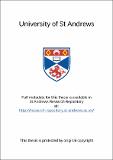Files in this item
Semantic theory and sentential understanding : a discussion of tacit knowledge and compositionality
Item metadata
| dc.contributor.author | Miller, Alexander, 1965- | en |
| dc.coverage.spatial | 96p | en |
| dc.date.accessioned | 2021-04-08T08:57:06Z | |
| dc.date.available | 2021-04-08T08:57:06Z | |
| dc.date.issued | 1989 | |
| dc.identifier.uri | https://hdl.handle.net/10023/21834 | |
| dc.description.abstract | This essay is an attempt to look critically at some issues arising from the idea that competent speakers of a natural language can tacitly know an extensionally correct theory of meaning for their language. In the first chapter I outline the idea that sentential understanding is to be construed as an ability, and argue that a speaker's tacitly knowing a theorem of a semantic theory should be construed as his possessing an intention to uphold the regularity prescribed by that theorem. I then go on to deal with objections that have been raised against the idea that speakers can have such tacit knowledge by Baker and Hacker, Appiah, and McDowell. In the second chapter I ask whether a similar story can be given concerning tacit knowledge of the axioms of a semantic theory, and come to the conclusion that it cannot: using modifications of arguments by Evans, Wright, and Stich, I show that speakers cannot be ascribed intentional states corresponding to semantic axioms. I then go back to argue that the ascription of such intentional states corresponding to theorems does not violate a plausible constraint on the ascription of such states. In the third chapter I look at the prospects for the use of the notion of tacit knowledge in the justification of the compositionality constraint. Beginning with Evans, I eventually come to the conclusion that tacit knowledge of a semantic theory is a sort of causal explanatory structure, to be found in the abilities which constitute language mastery : this finds expression in Davies' version of the mirror constraint. Inter alia , I sketch responses to difficulties that have been pointed out concerning this account by Wright, Davies, and Sainsbury, but conclude that there are still at least some difficulties looming which stem from the later Wittgenstein's attack on the objectivity of meaning. | en |
| dc.language.iso | en | en |
| dc.publisher | University of St Andrews | en |
| dc.subject.lcc | B944.S4M5 | |
| dc.subject.lcsh | Semantics (Philosophy) | en |
| dc.subject.lcsh | Compositionality (Linguistics) | en |
| dc.title | Semantic theory and sentential understanding : a discussion of tacit knowledge and compositionality | en |
| dc.type | Thesis | en |
| dc.type.qualificationlevel | Doctoral | en |
| dc.type.qualificationname | MLitt Master of Letters | en |
| dc.publisher.institution | The University of St Andrews | en |
This item appears in the following Collection(s)
Items in the St Andrews Research Repository are protected by copyright, with all rights reserved, unless otherwise indicated.

